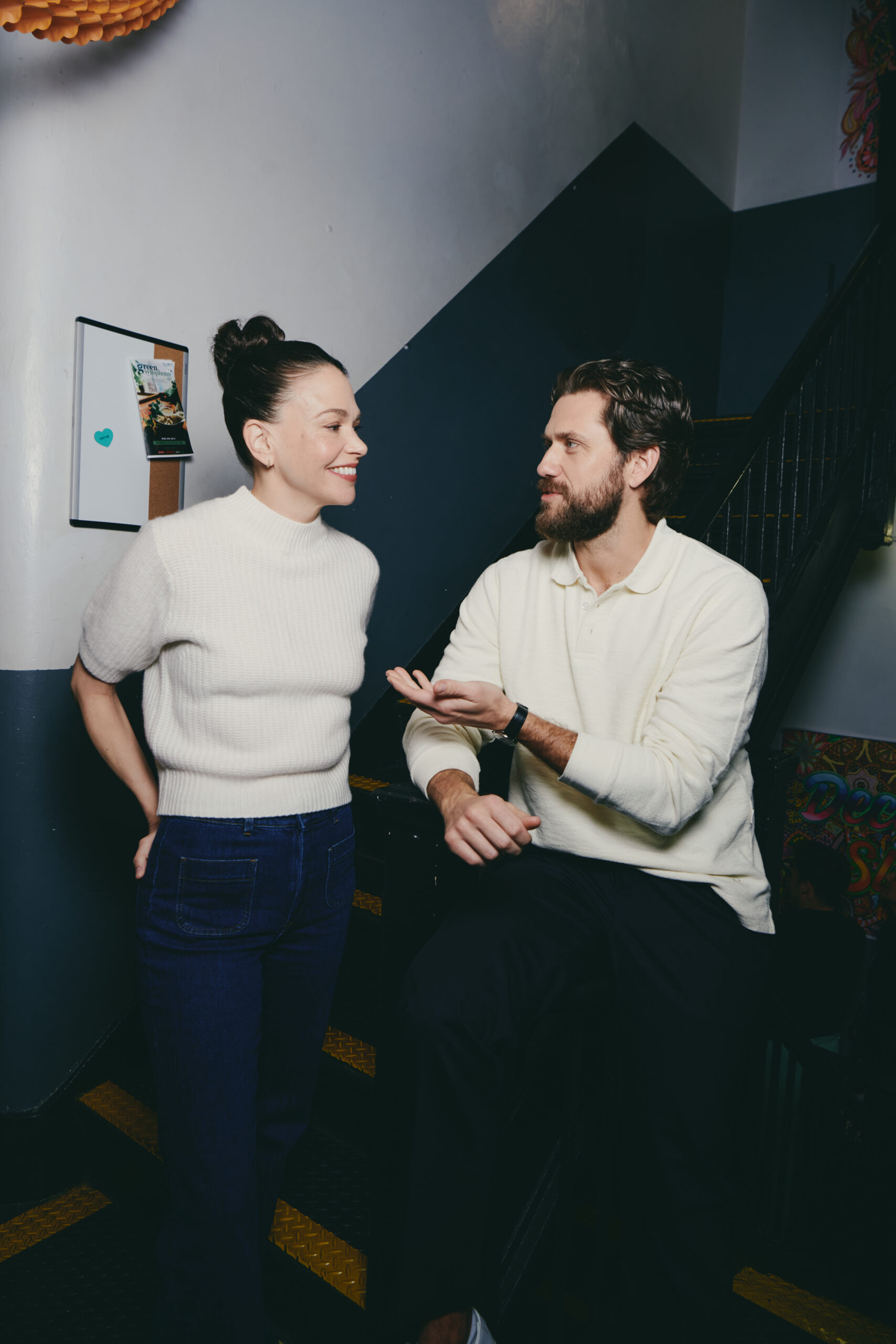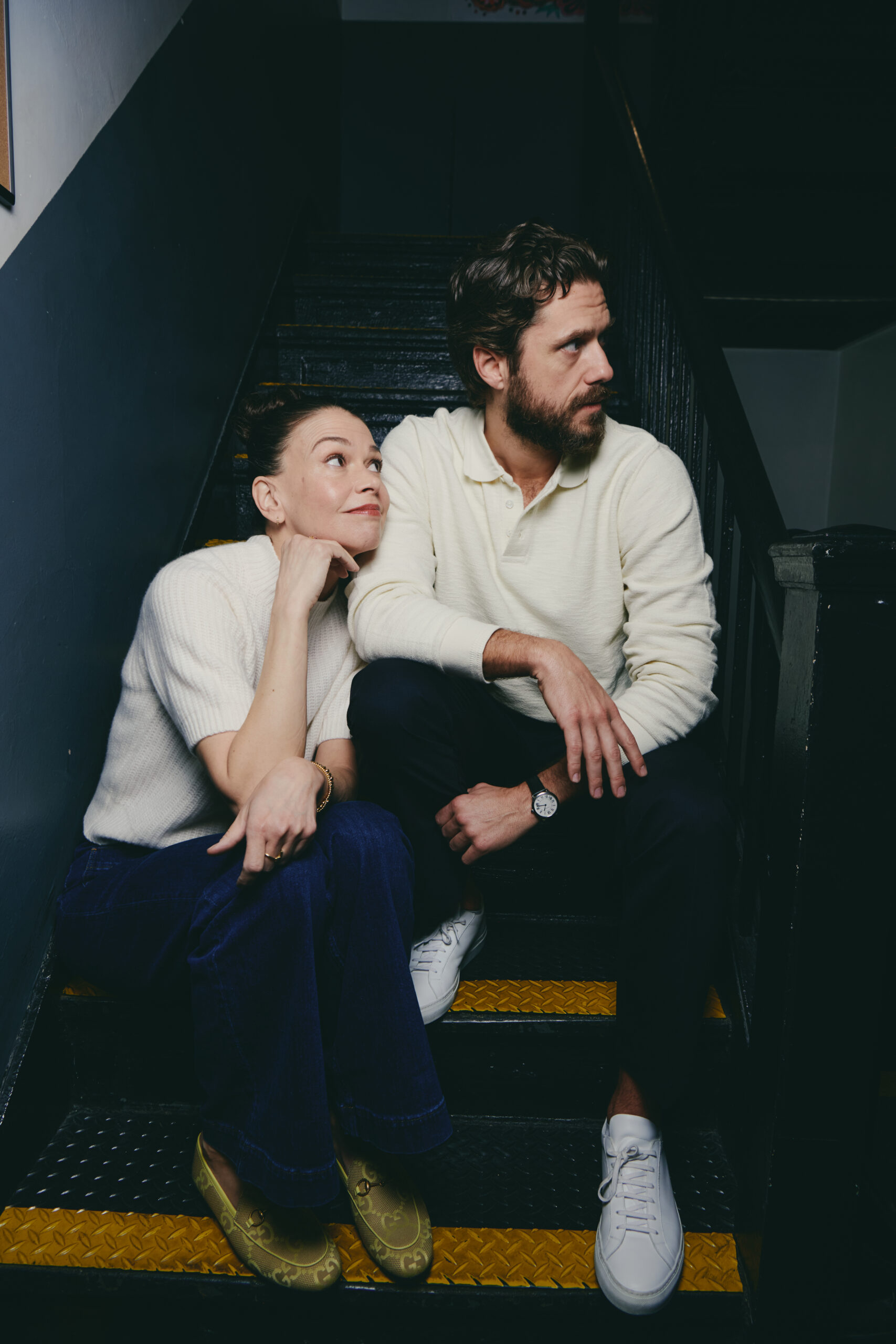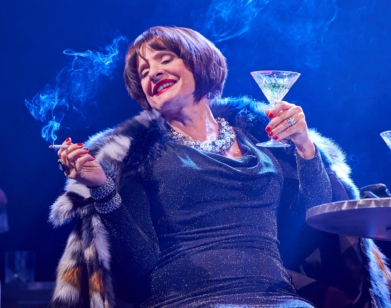BACKSTAGE
Aaron Tveit and Sutton Foster Are Making Sweeney Todd Horny Again
On a wall separating the dressing rooms of Aaron Tveit and Sutton Foster, the latest leading duo to step into Sweeney Todd: The Demon Barber of Fleet Street, is a giant, Lisa Frank-style coloring poster that reads: DECEIVING SLUTS. It’s a line from Hugh Wheeler’s book of the Stephen Sondheim musical, yet not one you’d associate with its typically cheery new stars. But then again, nothing about their turns in the Thomas Kail-directed revival is typical.
Foster, a two-time Tony Award-winner and bona-fide musical comedienne, hopped into the blockbuster production just five days after cracking jokes in New York City Center’s two-week run of Once Upon a Mattress. Tveit, meanwhile, is a boyish heartthrob with a Tony and a stint on the original Gossip Girl under his belt. The announcement that these two, beloved for the warmth they bring to every part, would replace Josh Groban and Annaleigh Ashford in the murderous tale came as almost as big a shock as their ultimate triumph in the roles. They’re still a vengeful barber and a pitiful pie-maker who team up to slit, bake, and sell unsuspecting victims, but Tveit and Foster have found a tender love story beneath their bloody exploits.
And, ever the show-stopper, Foster found a way to massage Tveit’s nipples with her feet in a ferociously horny sight gag. I stopped by his GQ-editorial-coded dressing room at the Lunt-Fontanne Theatre to talk Sondheim, making villains their own, and the ear-splitting applause they’re pulling each night.
———
JUAN RAMÍREZ: What’s with the “deceiving sluts” on the wall?
AARON TVEIT: That’s a line in the show.
SUTTON FOSTER: And there’s “poppin pussies.”
RAMÍREZ: “Split me muff.”
FOSTER: Yeah, they’re all lines from the show. There’s big coloring pages, too.
TVEIT: I was here one day before we started. It was an hour before the show, and I was trying to leave as fast as I could but I got caught in the stairwell while they were ceremonially changing the coloring pages. It’s a thing in the theater that every time they change shows, they unveil the new ones.
FOSTER: Since we came on a year into the run, we’re learning about all these traditions. Outside of my dressing room downstairs, there’s a big white board, and my dresser Julian started a game where you create songs using the word “pie.” So there’s “Pie will always love you” and “Got to find my corner of the pie.”
RAMÍREZ: What else have you inherited? I heard you got some puzzles from Annaleigh.
FOSTER: Oh, we did. Annaleigh used to do puzzles. I haven’t started the tradition yet because I think coming in, I’ve been really nervous. What else have we inherited?
TVEIT: As scary as it can be coming on to a show like this, everyone’s been so welcoming. But I think all these little traditions we’re talking about, that doesn’t happen everywhere. There’s a camaraderie here that’s really palpable.
FOSTER: There’s one thing that the audience sees, and then there’s this whole backstage world. And we’re here doing the exact same thing every night on stage, so to have all these fun things backstage is really nice.
RAMÍREZ: Have you relaxed at all? Because you came in so hot from City Center.
FOSTER: I know, I know. I crochet. That’s one of my backstage things. Maybe I should start a crochet circle and teach everybody how to crochet. I sit on my little tuft in between my scenes and crochet. It’s sort of panic crocheting. This is the beginning of our fifth week of doing the show, and I think I’m just now kind of feeling like, “Oh, all right, I’m not flop sweating through my costumes.”
TVEIT: It took me a couple of weeks, too.
FOSTER: I’m still making mistakes. I’m still figuring things out. But that’s just part of the process.
TVEIT: We’re really having fun now.
FOSTER: I think so.
RAMÍREZ: Were you tense at first?
FOSTER: Oh, yeah. There was definitely fear of just complete failure.
TVEIT: It’s the artistic process in a concentrated way. It’s the self-loathing, the whole thing you have to go down to feel confident. I haven’t replaced [another actor] in a show this way in a long time. We had to jump on this moving freight train show, so it was scary. We had time. We were prepared. We had wonderful dress rehearsals with the company and the orchestra, thank goodness. But then at some point you have to take the training wheels off and it was utterly terrifying.
RAMÍREZ: How long ago did you two start developing the relationship with the characters?
TVEIT: Proper rehearsals in December, but we took November to kind of learn the show together, but separately.
FOSTER: We had about four weeks of rehearsal, just the two of us in a rehearsal studio in Midtown. And then they started bringing in some of the cast members, which was like, “Whoa.” Every day there would be a new person in the room, and you’re like, “Oh gosh.” And then we came to the theater. And then it all led up to a put-in at the beginning of January. It was our first put-in, and then I went away for three weeks to go do Once Upon a Mattress at City Center, and then I came back.
RAMÍREZ: Aaron, did you go see her in Mattress?
TVEIT: I did! I really couldn’t really understand what I was seeing because we’re just doing this very intense play here, and then to see the freedom she had on the stage doing that was really remarkable.
FOSTER: It was a wild time.
RAMÍREZ: It kind of feels like a new show. How did you find your own Sweeney and Lovett?
TVEIT: I just had a thought about the show. First of all, when I saw this production, I was blown away because I think this is the fifth production of Sweeney that I’ve seen. But to see it at this scale, with a 26-piece orchestra, I was like, “Oh, this is what this show can be.” But then the very last moment of the show, when Sweeney and Lovett take hands and jump into the pit together, I said, “Oh, it’s a love story.” And so I think we both understood that and approached it from that way.
FOSTER: I’d never thought of it that way.
TVEIT: I hadn’t either. And so to see that, you’re like, “Oh.” And then it’s a very interesting thing that we only had each other in the rehearsal room. Usually, in rehearsal, you’re forging all these relationships with all these different characters. We only had each other. We were both thinking of this as a love story and we only had each other to lean on, and I think that it created such a foundation for the two of us.
FOSTER: They need each other and we need each other.
TVEIT: Yeah, what we were doing is what the characters were doing in the show.
RAMÍREZ: You two are super talented and are killing it in this production, but you’re not exactly the first people I think of when I think of Sweeney and Lovett.
TVEIT: I think that’s very fair. What’s so wonderful about this show is that it’s much like a Shakespeare piece. The show is so good that every single person that steps into a show kind of gets to do their own take on it. It allows for any kind of swing at the material you want. It’s about missed connections and timing and love, and for Sweeney in particular, I’ve always had a thought that it’s really just this guy who ends up back in London with a chance to get his life back together, this life that was wrongfully taken away from him. So my thought was, why can’t we just watch this guy learn all these things he doesn’t know, see him go out for revenge, and then see his veneer crack where he decides that everyone deserves to die. When I first spoke to Tommy [Kail, the director] about it, I said, “What do you think is going on when he steps off the boat?” And Tommy said, “He just wants to get his family back.” They’ve totally given me the freedom to do that my way, and my way is not the way that anybody else would do it, right? Everybody would do it differently. And the material can stand up to whatever approach. It’s that good.
FOSTER: In rehearsals, someone had come up to me and said, “Oh, I can’t see you playing a villain.” And I’m like, “I don’t see her as a villain or even an evil character.” I see her as someone who’s desperate and lonely and maybe a little manipulative and wants to be needed. At the end when Sweeney says that he’s been locked out of sight all these years, that’s how she feels. She hasn’t been seen. Suddenly someone walks in and sees her, and she’s like, “Oh, I’ll do it. This is great. What are we going to do?” There’s something exciting about that.
RAMÍREZ: Yeah, there’s real hunger in your role.
FOSTER: Oh, she’s hungry. And she’s complicated. I mean, this is a woman who doesn’t know how to love herself. She’s in the shadows.
TVEIT: Everyone’s fascinated with true-crime documentaries, and we watch these things about serial killers. And so many times when you watch those documentaries, they talk about how charming these people were. I think that’s the version of this that I was really interested in. Like, can we actually be nice to everyone on stage when it’s warranted? And then, when that switch turns, it’s the unpredictability that’s terrifying. I think that’s something that I was really interested in.
RAMÍREZ: In developing a relationship, how much play was there involved?
FOSTER: There was a lot of play. There were a lot of 3:00 AM ideas. I would come in and go, “I have an idea, I want to try this.”
TVEIT: Yeah. I said, “I woke up in the middle of the night and I was thinking about something. Can I try it?” And they’re like, “Yeah, try it.”
FOSTER: Really, every night is an opportunity. I feel hungry for the discovery of it. Aaron’s so game. There’s two numbers in the show where he just sits there and I just attack and he’s so game. I’m just flopping around everywhere.
TVEIT: One of my favorite things as an actor is to be the fall guy at any moment. I like to be the butt of every joke.
FOSTER: And one of my favorite things is to fuck with another actor.
TVEIT: It works so perfectly because it’s what is needed in those moments. We’re each playing into our desires.
RAMÍREZ: This is definitely the horniest I’ve seen you on stage.
FOSTER: Yes, she is horny, but it’s so funny. I don’t think she’s using her sexuality. If anything, I don’t even know if she knows her own sexuality. She’s just so desperate for anything, whatever that looks like. But yeah, I guess it is the most horny, but it’s a desperate need for intimacy, whatever it looks like.
RAMÍREZ: The foot thing, where did that come from?
TVEIT: It came from Sutton saying, “Hey, do you mind feet up in your face?” And I said, “You can do whatever you want to me.”
FOSTER: I had this image of getting upside down and being on the floor and looking up at him as a tactic of trying to get his attention. And then it evolved from there. I never intended to have foot play. But now I spray my feet with some nice-smelling stuff.
TVEIT: Thank you.
RAMÍREZ: It’s maybe [Sondheim’s] most dense show. Are you still working through the lyrics?
FOSTER: I go over “Worst Pies” every day twice before I do it. And then I go over “God, That’s Good,” and I go over “By the Sea.”
TVEIT: I go over “Johanna (Act 2 sequence).” There are two specific moments in the show where I’m literally counting to make an entrance. I do this thing in “Pretty Women,” there’s this bit, I jump in on “Tis Your Delight…” where I’m holding the shaving cream cup to keep it up, and I have to finish whistling and then do five counts. I hit my last whistle, and on my last whistle is my first swirl with the brush. And I go “one, two, three, four, five.” That’s the only way I can do that entrance because I’m counting with a shaving cream brush. It’s so amazing, but it’s so difficult. It’s the hardest score I’ve ever learned.
FOSTER: I still make mistakes. There’s one thing I’ve never sung correctly, and every night I just sort of black out, and I’m like, “Please, no one notice.”
RAMÍREZ: Would it be safe to call these the darkest characters you two have played?
TVEIT: To me, I don’t think so. I don’t think this is a dark character. I think this is a guy whose life was ripped away from him and he thinks there’s a chance he can get it back and then finds out that he can’t. My question is, as an audience member watching, if you watch the show, would you, in these same circumstances, make these same decisions? Circumstantially, the 15 years of trauma that this guy has been through catches up to him. I think the hope of getting his life back is the one thing keeping him out of this well of trauma. And then, once that light is distinguished, it’s all out on the table.
FOSTER: And I think of Mrs. Lovett as more complex. I actually don’t think of her as a dark character. I think of her as actually kind of jovial. All she wants is to make a good life.
TVEIT: But I also think that’s our job as actors, too. Because I’ve been in other things before where people have said, “Oh, you were such an asshole in that.” And I would say, “Really? I thought he was just…” But I think it’s like an Acting 101 thing. You have to make positive choices. You have to be going towards something that you think or your character thinks is positive.
FOSTER: Always. Until the very end. I’m kind of like, “Well, it seems like I’m actually cleaning up your mess. Everything’s going great!” Until it isn’t.
RAMÍREZ: Well, let’s talk about the end. Have you gotten this type of reaction before? It’s fucking deafening.
FOSTER: I’m dissociating a bit.
RAMÍREZ: Really?
FOSTER: It’s overwhelming, but I’m more excited about the fact that just the show itself is just being celebrated in such a massive way. That is thrilling to me.
TVEIT: I feel like so many people who have never seen Sweeney are coming to see this production, they’re taking in the material like they take in a rock concert. That’s what’s really cool about this, feeling like you’re bringing something that’s maybe the greatest musical ever written to this brand new audience. They’re responsive and they’re loud and they’re apparent, but they’re also silent when they need to be. That’s the coolest thing.







